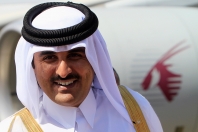Qatar needs to stop funding Islamists: Dennis Ross
Dennis Ross/USA Today/May 09/17
Qatar wants to have it both ways — have a U.S. base and fund Muslim Brotherhood.
President Trump is looking anew at American allies and partners. While saying he will preserve these relationships, he wants them to pay their fair share and uphold their side of the relationship. Whether it is South Korea or Saudi Arabia, they are subject to his calls for them to contribute more and defray our costs in deploying forces to defend them. Burden-sharing is not a new concept, but he is placing a premium on it. It is an important measure, and it should be given greater weight, but it must also be kept in perspective. Consider that one country that would do well on this measure is Qatar. Qatar permitted us to build and operate a massive air base, al-Udeid, and has helped meet the costs of operation. From al-Udeid, the U.S. conducts all coalition air operations for the entire region — from Afghanistan to Syria. It is a critical base for protecting our national security interests in the Middle East, and viewed from this perspective alone, one might judge Qatar to be an American ally.
However, allies at a minimum share our interests, support our basic policies, and see common enemies. They don’t give support, especially material support, to those who threaten our interests and the interests and well-being of our friends and partners. By this measure, Qatar is most definitely not an ally. Few countries have done more to promote the Muslim Brotherhood, including its Palestinian offshoot Hamas, than Qatar. The actions of the Muslim Brotherhood may vary from country to country, but it rationalizes attacks against American forces and interests, rejects the very concept of peace with Israel, and promotes religious intolerance. During Pope Francis’s visit to Egypt, Samuel Tadros points out that the Muslim Brotherhood’s Alexandria account tweeted: “The Pope of Terrorism, he came to end what remains of Islam.”
That tweet is in keeping with the mindset and beliefs of the Brotherhood-affiliated preacher, Yusuf al-Qaradawi, who resides in Qatar and conveys his views on a weekly show on the network Al Jazeera. Qaradawi, who is anti-American and considers all attacks against Israeli civilians to be legitimate, is especially pernicious because his weekly guidance on how to live as a good Muslim has produced a large following in the region. Al Jazeera is subsidized by the government of Qatar and has long given a platform not just to Qaradawi, but to those who favor the Muslim Brotherhood and Islamists more generally. True, it has others appear who argue against these views, but by legitimizing extremist, intolerant beliefs, giving them equal standing with others, and allowing their constant repetition, it lends credence to them.
Unfortunately, it is not only through the soft power of Al Jazeera that Qatar promotes radical Islamists. In both Libya and Syria, Qatar provided money and material not to the more secular forces but to the Islamist fighters. Indeed, when I was in the Obama administration in 2011 and we sought to get the Qataris to coordinate with us and to be transparent about where and to whom they were sending arms in Libya, we rarely got straight answers. And, consistently, we found that they sent weapons to the Islamist forces, the very militias we were opposed to getting arms. The same pattern has been followed in Syria.
How can one account for Qatar’s behavior? Qatar is a very small country that has ambitions to play a larger out-sized role in the region and beyond — and it has used it natural gas and oil wealth combined with a tiny population — to use its money to build influence. While some may say it has used its money to buy off Islamists so they will not cause a problem in Qatar, the Qataris prefer to present themselves as playing a bridge-building role between the Islamists and the West. That argument might be more convincing if there were any evidence that Qatar used its position to moderate the behavior of the Brotherhood or other radical Islamists. But there is no real sign of that.
Instead, what one sees is that Qatar appears to want to have it both ways. Preserve its ties to us and to the Islamists — keep the U.S. base in Qatar as a way of ensuring an American stake in Qatar’s security and deterrent against more overt threats to the country and preserve the ties to the Muslim Brotherhood and like-minded groups; bring in American universities to establish campuses and highlight the investment in western-oriented education and values even as it continues to underwrite Al Jazeera and its role in spreading a narrative that challenges those very values.
Qatar can only have it both ways so long as we permit it. Qatar’s leaders clearly want the American security connection. Trump should make it clear to them that they will have it so long as they are not threatening our interests and those of our partners in the region. As important as the al-Udeid base is, the Qataris should know we have alternatives and are prepared to develop them in the UAE and elsewhere unless Qatar is prepared to be a genuine partner and not a party that contributes to the very threats we need to counter.
**Former Ambassador Dennis Ross is counselor at the Washington Institute for Near East Policy and served in senior national security positions in the Reagan, Bush, Clinton and Obama administrations. His most recent book is Doomed to Succeed: The US-Israel Relationship from Truman to Obama.






















